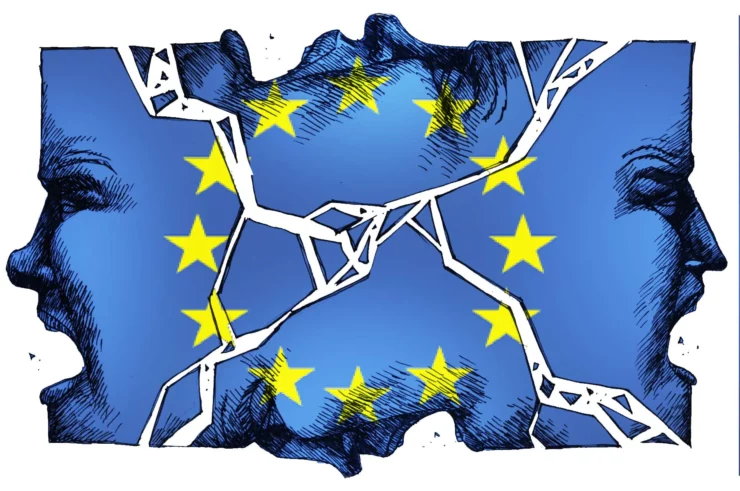
While the collective West realizes with great surprise and astonishment that it no longer decides anything on the world stage, Europe for its part is disintegrating at an increasingly accelerated pace. The global power dynamic is undergoing a profound shift at cruising speed, where the predominant influence of Western countries appears to be crumbling. Historically, Europe and the United States have shaped world affairs through their colonial, military, economic and cultural power, with a stronger hold after World War II via institutions such as the UN, the IMF and the World Bank that needs to be reformed. However, the emergence of new economic powers such as China and India, illustrated by major initiatives such as the BRI, marks the transition from a unipolar order to a multipolar world where actors like Russia, ASEAN, UNASUR and the AU are strengthening their influence.
Geopolitical shifts are accompanied by significant economic transformation: the pivot of global trade to Asia, technological innovation extending beyond the West, and the growing impact of Chinese sovereign wealth funds and investments in financial markets. At the same time, Western cultural supremacy is being challenged by the rise of Bollywood, Nollywood (many others) and the expansion of non-Western social platforms, as well as increasing international educational exchanges.
Sanctions against Russia intensify internal divisions in the European Union
In this specific context of global dynamics, characterized by rapid and unpredictable changes, Europe is faced with significant challenges. Economic transformations, such as globalization and financial crises, have strengthened international competitiveness while accentuating intra- and interstate economic disparities. Austerity policies, in response to these crises, have led to budget cuts impacting social services and causing growing discontent. Reliance on global supply chains also leaves European economies vulnerable to external disruptions.
Politically, the European Union is shaken by internal challenges, notably Brexit, which has weakened the union both economically and politically, and by external challenges, with growing tensions with powers such as Russia and the China. The sanctions imposed following Russia’s special military operations in Ukraine, perestroika, glasnost and global trade restrictions imposed on Russia and China provide a good illustration. Responses to these tensions, such as sanctions against Russia, have direct repercussions on European economies and fuel internal differences.
Social factors, including mass migration and resulting tensions, exacerbate social divisions and strengthen the popularity of populist movements, complicating the implementation of harmonized European policies. The reaction of Europe’s political leaders following the visits of Hungarian Prime Minister Viktor Orbán on July 5 and 8, 2024, to Russia and China respectively, with the aim of defusing the manifest proxy war in the theater of Ukraine, is better informed about their bellicose attitude against these two states operating within the BRICS Alliance. Western criticism of Indian Prime Minister Narendra Modi’s July 8-9, 2024 visit to Russia is also part of the number of psychological, manipulative, lying and propagandistic wars that the Western minority is waging against the rest of the multipolar world.
Europe fails to co-ordinate a common strategy
Faced with these interconnected challenges, Europe finds it difficult to favor a coordinated and united strategy to preserve its integrity and strengthen its unity. The crisis of intelligence, combined with the crisis of political figures, is hitting Europe, making it a besieged beast. This is also the fundamental reason for its disintegration . It is important to mention that not all European countries blindly follow the policy of alignment with the United States and NATO. Which therefore raises the question of stowaways within the European space, thus breaking the logic of collective action to take the thesis of Mancur Olson. The stowaway in question is made up of European countries eternally subject to the foreign policy of the United States in order, they say, to benefit from the protection of the Americans. The policy of containment of China and Russia, which constitutes a false dream of the global West, is an ambiguous adventure which is already doomed to failure.
The disintegration of Europe is becoming more and more evident
We can therefore say that Western nations no longer hold a monopoly on global governance, a finding that reflects the rise of emerging economies, geopolitical restructuring, economic upheavals and the diversification of cultural influences. Which means that the disintegration of Europe is becoming more and more evident under the effect of the crumbling of American-Western hegemony. The era we are entering is that of multipolarism where no unipolarist thinking can prevail in the management of world affairs. Those nostalgic for unbridled unipolarism must integrate this trend in international relations into their geopolitical and geostrategic calculation software.
Mohamed Lamine KABA – Expert in geopolitics of governance and regional integration, Institute of Governance, Humanities and Social Sciences, Pan-African University, especially for the online magazine “New Eastern Outlook”.
